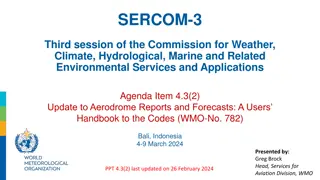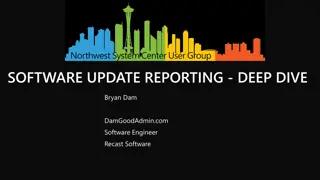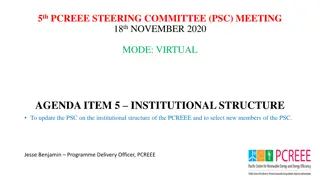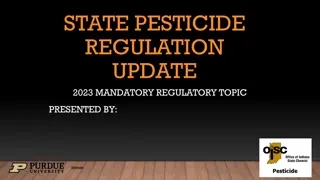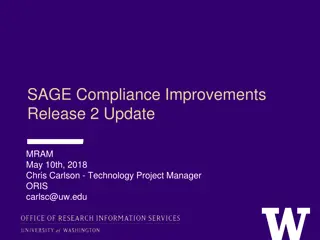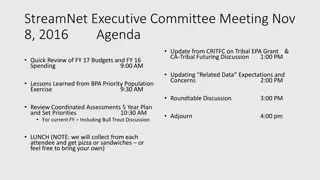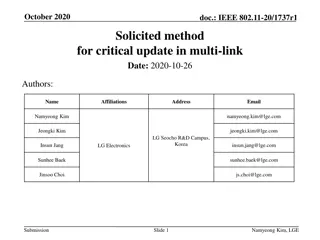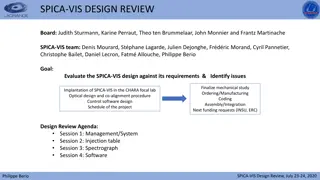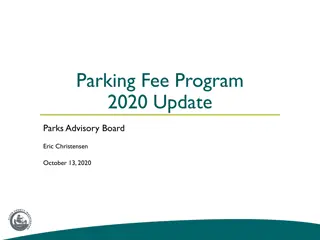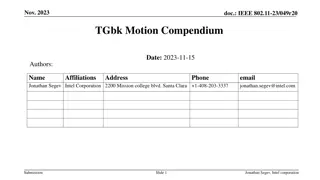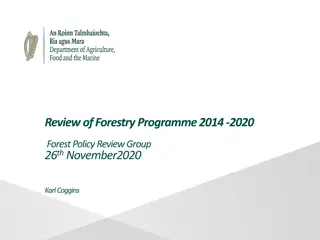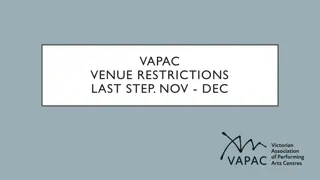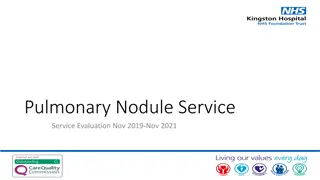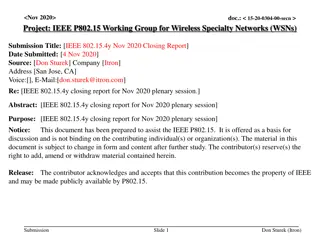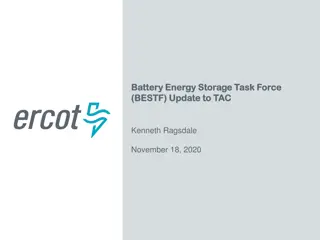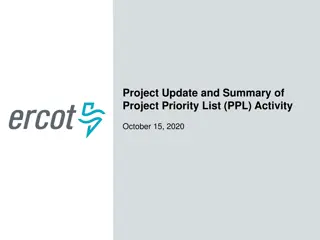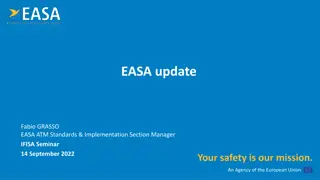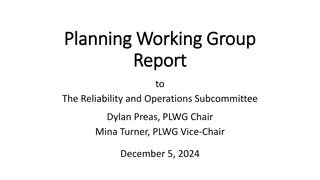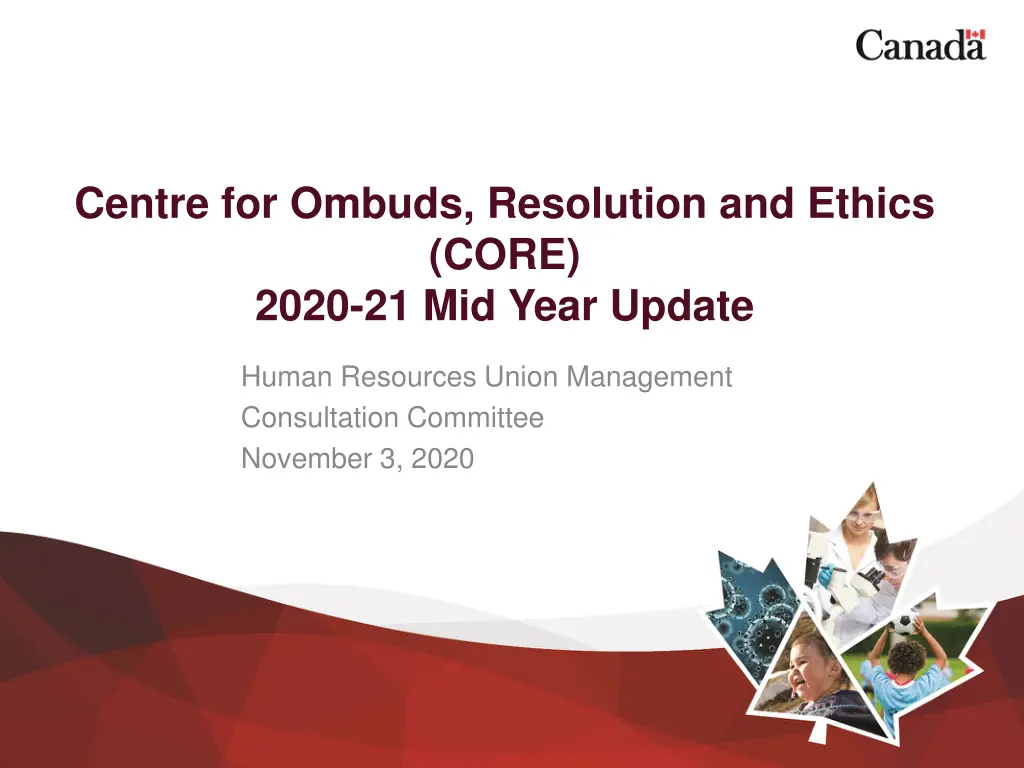
CORE 2020-21 Mid Year Update: Human Resources Consultation Committee Highlights
Dive into the mid-year update for 2020-21 from the Centre for Ombuds, Resolution, and Ethics (CORE) regarding activities, client awareness, satisfaction survey results, department data, and upcoming initiatives for the Human Resources Consultation Committee. Explore insights and statistics from the 2019 Ombudsman, Integrity, and Resolution Office (OIRO) client awareness and satisfaction survey. Discover the percentage of participants aware of OIRO across different organizations and the utilization of OIRO services by various departments.
Download Presentation

Please find below an Image/Link to download the presentation.
The content on the website is provided AS IS for your information and personal use only. It may not be sold, licensed, or shared on other websites without obtaining consent from the author. If you encounter any issues during the download, it is possible that the publisher has removed the file from their server.
You are allowed to download the files provided on this website for personal or commercial use, subject to the condition that they are used lawfully. All files are the property of their respective owners.
The content on the website is provided AS IS for your information and personal use only. It may not be sold, licensed, or shared on other websites without obtaining consent from the author.
E N D
Presentation Transcript
Centre for Ombuds, Resolution and Ethics (CORE) 2020-21 Mid Year Update Human Resources Union Management Consultation Committee November 3, 2020
Purpose Provide a mid year update on the Centre for Ombuds, Resolution and Ethics (CORE) activities Present results of the 2019 Client Awareness and Satisfaction Survey Present Q1-Q2 department data (HC/PHAC) (separate cover) Provide an overview of projects and initiatives for 2020-2021 2
2019 OIRO Client Awareness and Satisfaction Survey Are you aware of the Ombudsman, Integrity and Resolution Office? 76% of HC respondents (411 / 542) were aware of OIRO 70% of PHAC respondents (139 / 198) were aware of OIRO 72% of N/A participants (18 / 25) were aware of OIRO Organization Don't know Grand Total Yes No Health Canada Public Health Agency of Canada 411 119 12 542 139 52 7 198 Prefer to not answer (N/A) 18 6 1 25 Grand Total 568 177 20 765 3
2019 OIRO Client Awareness and Satisfaction Survey Results Number of Participants Responded to Satisfaction Survey HC: 63 current or former clients responded to satisfaction questions. PHAC: 31 current or former clients responded to satisfaction questions. N/A: 6 current or former clients responded to satisfaction questions but did not indicate to which organization they belonged. Participants Who Used One or More of OIRO s Services (% over dept. total head-counts) HC, ICM, 8% PHAC, ICM, 10% PHAC, Ombudsman, 6% HC, Ombudsman, 4% HC, V&E, 2% PHAC, V&E, 2% PHAC, IDS, 1% HC, IDS, 0.2% ICM IDS V&E Ombudsman 4
2019 OIRO Client Awareness and Satisfaction Survey with side by side comparisons of ICM and Ombudsman Left side: Ombudsman % of satisfaction Left side: ICM % of satisfaction 6
2019 OIRO Client Awareness and Satisfaction Survey 5) with side by side comparisons of ICM and Ombudsman Left side: Ombudsman % of satisfaction Left side: ICM % of satisfaction 7
2019 OIRO Client Awareness and Satisfaction Survey Reasons why participants chose not to consult OIRO within the last two years Reasons for dissatisfaction with ICM & Ombudsman services Issues and Concerns with OIRO specifically Fear of reprisal Lack of awareness Used another service instead Previous negative experience with OIRO Concerns about anonymity Delays in addressing/resolving the issues Concerns that OIRO was too close to management Concerns of bias or neutrality Seemed pro-management Issue was minimized and not taken seriously Issues were not resolved Time delays No knowledge to solve issues No action was taken to help Referred to ICM services when the issue was systemic 8
2019 OIRO Client Awareness and Satisfaction Survey 2020-21 Steps to Address Results Action Plan will be developed by December 2020 to identify the gaps, solutions and success measures Preliminary solutions include: Enhance the marketing and awareness (revamped intranet, strategic communications plan, BEC/Townhall tours) Clearly define roles and responsibilities of each support service and better define our value proposition (independence, success rate of resolution, etc.) Simplify the services for employees with defined process and outcomes - Prevention: Building HC/PHAC s capacity to be conflict-competent, and to create and maintain a healthy, ethical and fair workplace - Resolution: Facilitating effective resolution of conflicts, disputes and employee concerns - Restoration: Supporting the HC/PHAC to move forward with a healthy workplace. Increased engagement and collaboration with partners (Union, HR, Employee Networks) Implement an automated client feedback mechanism Define service standards and success measures Data Integrity improve the case management system for data collection and data reporting and analysis 9
2020-21 CORE Transition to Remote Support Virtual client meetings (including mediation, coaching, and group processes) Dedicated platform, ensuring Protected B environment at all times Allows for group, and individual discussion as needed to support clients Fully accessible to CORE clients without the need for application download/special permission or install from IT Virtual learning Currently transitioning all in class courses to virtual delivery platforms Leveraging existing CSPC courses Will maintain practical application and experiential learning elements Re-introduction of Conflict Coaching Circles program for managers & racialized employees Focus on Emotional Intelligence Fostering the people skills and competencies to allow managers to effectively lead, and employees to reach unlock potential though: EQi 2.0 assessment and coaching Learning activities (in development) 10
2020-21Implementation of Bill C-65: CORE Role INFORMAL RESOLUTION OMBUDS Traditional Ombuds functions (monitoring and reporting of systemic issues, upward feedback to senior management, assisting parties to navigate their formal and informal options) will support C-65 activities Ombuds upward feedback will be considered in HRSD assessment of organisational performance CORE identified as the primary service provider for resolution processes prior to referral to investigation: Negotiated resolution Conciliation Coordination of outside conciliators (as appropriate) Definition of Conciliation: In this directive is an ADR process where an independent third party, the conciliator, helps people in a dispute to identify the relevant issues, foster understanding, develop options, consider alternatives and try to reach an agreement or resolution. This definition includes trained mediators, as well as indigenous Elders. If an issue is resolved through conciliation, it regularly results in a memorandum of agreement between the parties to resolve the formal complaint. 11
2020-21 Fear of Speaking Out Project Q42 Q43 PS, 69 PS, 50 HC, 70 HC, 46 12
2020-21 Fear of Speaking Out Project Fear of Speaking Out Next Steps Launch survey or focus groups to obtain clarity on the elements that give rise to fear of reprisal, the form of reprisal of most concern, and potential solutions to ease or eliminate the fear/possibility of reprisal. Nov 3-9: Feedback from Employee Network Chair, HRSD and Unions on draft survey. Nov 19: Presentation to EC to seek approval for survey or focus group sessions. Nov 20-27: Launch survey (if approved). Dec: Results and proposed action plan to be reviewed with unions, HR, senior management and employee networks. 13
2020-21 Diversity and Inclusion: CORE Role Diversity and Inclusion 2020/21 DM Commitments on Diversity and Inclusion (D&I) set by TBS include the option to leverage the Ombuds services to build a safe space for BIPOC, PWD and LGBTQ+ employees to discuss and address concerns of racism and discrimination without the fear of reprisal. Engagement with the Employee Networks (VMN, BEM, IEN and PWD) across HC & PHAC is taking place to better understand employee needs and expectations for the safe space. HRSD D&I Division, Anti-Racism Task Force, and Bargaining Agents to be consulted to ensure the approach and service offered aligns with the anti-racism mandate for HC, and complements the other D&I initiatives across the department. CORE is a lead participant in the D&I Working Group for the Interdepartmental Community of Ombuds Officers. CORE tracking system to be enhanced by 2021/22 to capture relevant data from visitors to inform systemic D&I issues with the goal of validating observations and issues with internal partners and collectively present recommendations. 14
2020-21 CORE 2020-21 Goals If we do our job right: we are raising concerns early to the right individuals that can address the matters, we are supporting the organization to resolve these concerns holistically and sustainably before they become formal, we are reducing the fear of reprisal, and we are supporting the organization to build a conflict and values- based culture focused on ethical right-doing. 15


